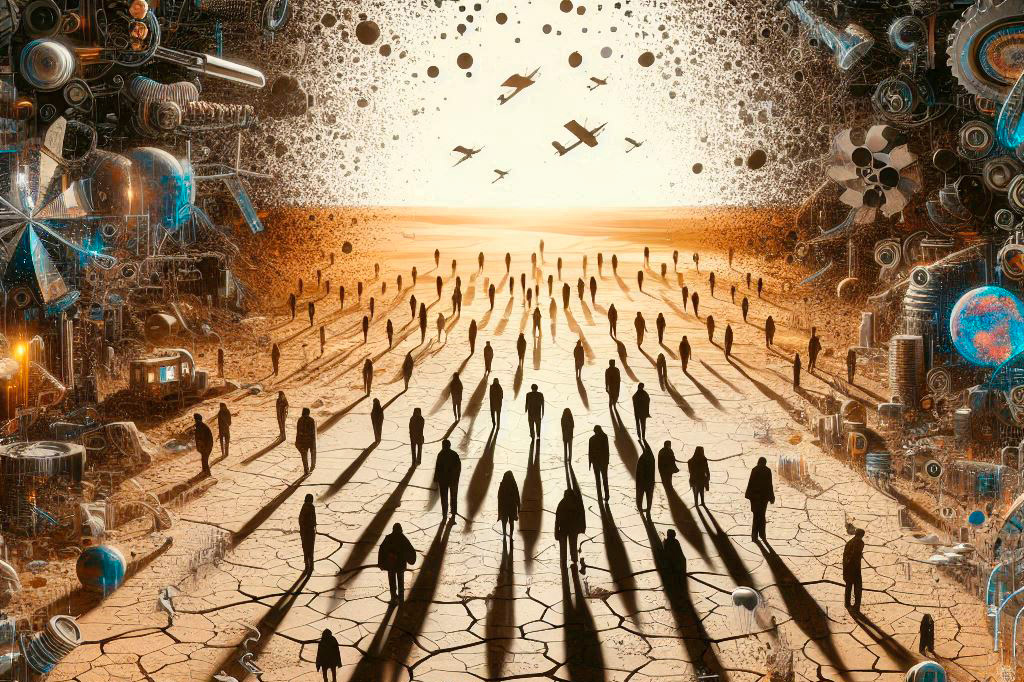Now, a couple of decades ago, few people knew what the words “dystopia” and “dystopian” mean but today they are frequently used buzzwords. Books, movies, games, comics, and what have you are labelled dystopian. Societies are described as dystopian and some even claim that we live in Dystopia. The question begs to be asked, what exactly is a dystopia?
The short version is that a dystopia is the opposite of a utopia, that is to say a utopia is a dream society whereas a dystopia is a nightmare society. People suffer due to for instance societal decay, run-away crime rates, an environmental collapse, overpopulation, a totalitarian regime, or technology gone awry.
The long version is a bit more complicated. A “nightmare society” can be anything, really. Everything from Sauron’s kingdom in The Lord of the Rings to the war-ridden Kongo-Kinshasa in Central Africa could be described as a nightmare society.
If we look at existing definitions, they tend to be vague. According to the Merriam-Webster Dictionary, a dystopia is, I quote, an imagined world or society in which people lead wretched, dehumanized, fearful lives. The Cambridge Dictionary explains that, I quote again, a dystopia is a very bad or unfair society in which there is a lot of suffering, especially an imaginary society in the future, after something terrible has happened. In the Oxford English Dictionary we find that a dystopia is, I quote, an imaginary place or condition in which everything is as bad as possible.
There’s no canon for dystopian works. Nevertheless, there are works which have always been labelled dystopian. Some examples are George Orwell’s Nineteen Eighty-four, Yevgeny Zamiatin’s We, Karin Boye’s Kallocain, and Aldous Huxley’s Brave New World. All of these works deal with totalitarianism in one form or another. This is a bit limiting, as nightmare societies can take many different shapes.
Looking at such vague definitions and narrow lists is probably fruitless. It’s probably more fruitful to look at works that often are labelled dystopian because they have some common denominators.
First, dystopian works depict fictional societies. This rules out postapocalyptic works like George Miller’s film The Road Warrior, as they focus on the very absence of a society. It also rules out claustrophobic works like J.G. Ballard’s novel High-Rise as they never actually show the society outside the characters’ dwellings. However, there’s a grey zone. For instance, the train in Bong Joon-Ho’s movie Snowpiercer can be described as a society in miniature.
Second, they usually depict an imagined future. Dystopian works highlight impending threats and serve as warnings and they can only do so by taking place in the future, really. There are exceptions, though. For instance, Robert Harris’ novel Fatherland takes place in Germany, not in the future, but in an alternate timeline where the Nazis have won the war, yet it’s through-and-through dystopian.
Third, they are warnings. Dystopian works can be warnings about authoritarianism, totalitarianism, environmental collapse, societal decay, overpopulation, genetic engineering, artificial intelligence, and what have you. They all have in common that they have something urgent to say. However, there are many works which basically only use dystopian concepts and aesthetics as a cool backdrop, mainly B-movies and video games.
Fourth, they are too one degree or another plausible. If they aren’t plausible, they are usually less scary and thus less efficient warnings. The creators behind them don’t necessarily claim that their nightmare scenarios will come true in a literal sense but that they at least are possible. Even so, there are notable exceptions. A dystopian depiction can achieve the same outcome by being satirical instead of plausible. An example of this is Mike Judge’s film Idiocracy, which is an over-the-top comedy with very dark undertones.
Fifth, they comment on contemporary society by focusing on dangerous trends. Dystopian fiction is as much about imagination as message. The most famous example of this is George Orwell’s highly influential novel Nineteen Eighty-Four which was a comment on the Stalinist system in the Soviet Union and the crypto-totalitarian tendencies in Western society at the time. This commentary often has a general political angle but is very seldom partisan.
Those are the common denominators. Maybe I’ve failed to include some important ones. If so, let me know.
